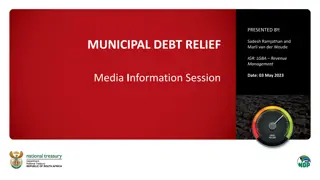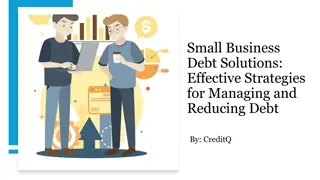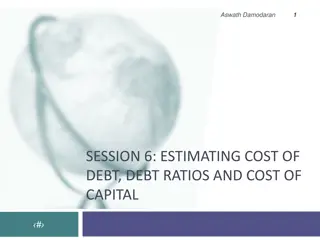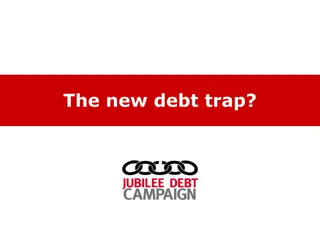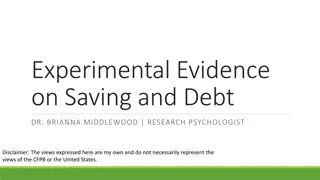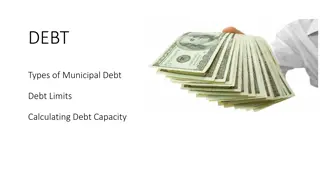
How Debt Works: A Comprehensive Guide
Explore the concept of debt, its uses for assets like homes and cars, and the implications of borrowing for current expenses. Learn about factors influencing debt, interest calculations, and examples illustrating debt repayment scenarios.
Download Presentation

Please find below an Image/Link to download the presentation.
The content on the website is provided AS IS for your information and personal use only. It may not be sold, licensed, or shared on other websites without obtaining consent from the author. If you encounter any issues during the download, it is possible that the publisher has removed the file from their server.
You are allowed to download the files provided on this website for personal or commercial use, subject to the condition that they are used lawfully. All files are the property of their respective owners.
The content on the website is provided AS IS for your information and personal use only. It may not be sold, licensed, or shared on other websites without obtaining consent from the author.
E N D
Presentation Transcript
How Does Debt Work Workshop
What is Debt? Exchange of goods, services or cash for the promise of a future payment of goods, services or cash that generally includes interest Future payment can all be due at a future date, or more often payment is made in installments
When is Debt Used? Often debt is used when a large asset is purchased such as a house or car Uses future earnings to repay the debt Makes the most sense for the purchase of an appreciating asset
Debt for a Home Purchase a home for $250,000 and assume 2% appreciation. Borrowed $200,000 with a 30-year mortgage at 4%. 500,000 450,000 400,000 350,000 300,000 Dollars 250,000 Home Value Balance Owed 200,000 150,000 100,000 50,000 - 1 23 45 67 89 111 133 155 177 199 221 243 265 287 309 331 353 Months
Debt for a Car Purchase a new car for $25,000. Finance for five years at 4%. 30,000 25,000 20,000 Dollars 15,000 10,000 5,000 - 1 3 5 7 9 11131517192123252729313335373941434547495153555759 Months Car Value Balance Owed
Borrowing to pay current expenses Happens if monthly expenses exceed monthly income Could be large or impulse purchases Often by use of credit cards Not sustainable When is Debt Used?
How Does Debt Work? There are three factors at play with debt How much you borrow How long you borrow it for The interest rate
The interest charged by the lender for debt begins accruing the date you borrow the money through the date the loan is paid off How Does Debt All payments are applied first to interest owed then to the balance owed Work? Formula for calculating interest is Balance owed x Rate x Period = Interest owed
How Does Debt Work? Example of a simple loan: You borrow $10,000 for one year at 8% interest How much would you owe when the debt comes due? $10,000 x 8% x 1 = $800 of interest Repayment = $10,000 + $800 = $10,800
How Does Debt Work? Installment loans Most common Generally are for periods of more than one year Partial payments are made monthly Each monthly payment includes an element of interest and reduction of the balance owed
How Does Debt Work? You borrow $10,000 for one year at 8% interest with a payment of $869.88 due at the end of each month Example installment loan:
Balance Payment Interest Payment Remaining Month Owed Made Owed of Balance Balance 1 10,000.00 869.88 66.67 803.21 9,196.79 2 9,196.79 869.88 61.31 808.57 8,388.22 3 8,388.22 869.88 55.92 813.96 7,574.26 4 7,574.26 869.88 50.50 819.38 6,754.88 5 6,754.88 869.88 45.03 824.85 5,930.03 6 5,930.03 869.88 39.53 830.35 5,099.68 7 5,099.68 869.88 34.00 835.88 4,263.80 8 4,263.80 869.88 28.43 841.45 3,422.34 9 3,422.34 869.88 22.82 847.06 2,575.28 10 2,575.28 869.88 17.17 852.71 1,722.57 11 1,722.57 869.88 11.48 858.40 864.17 12 864.17 869.88 5.76 864.12 0.05 10,438.56 438.61 Interest amount for payment 1 is $10,000 x 8% x 1/12 = $66.67 Total interest paid on this loan is less than the $800 in the first example. Why?? How Does Debt Work?
Credit Card Debt
Yes!!!!! Can I Pay Down Debt Faster? Any additional amount you pay above your required payment reduces the debt amount which pays the loan off much quicker (https://www.youtube.com/watch?v=y97rBdSYbkg) See https://www.ramseysolutions.com/real- estate/mortgage-payoff-calculator
1. Mortgage Is 30% or More of Your Income 2. Putting off Routine Home Maintenance 3. Property Tax Increases Stress You Out 4. Not Saving for Your Retirement 5. Making Monthly Minimum Payments on Your Credit Cards
Beware of no-interest or same as cash deals!! Other Consolidation is not a silver bullet You still owe the same amount What do you do each month with any savings from consolidation? Considerations
The rich rule over the poor, and the borrower is slave to the lender Proverbs 22:7


